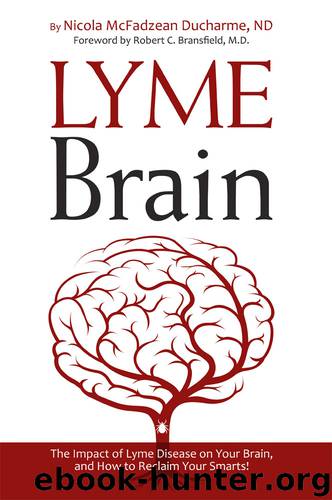Lyme Brain: The Impact of Lyme Disease on Your Brain, and How To Reclaim Your Smarts by Nicola McFadzean Ducharme ND

Author:Nicola McFadzean Ducharme ND [McFadzean Ducharme ND, Nicola]
Language: eng
Format: azw3
Publisher: BioMed Publishing Group
Published: 2016-08-21T16:00:00+00:00
NUTRITION TIP #5: AVOID SUGAR
One of the key tips to minimize Lyme Brain is to avoid sugar. There are a few different reasons for this.
A diet high in sugar is going to impact insulin levels and insulin sensitivity. Chronically high-sugar diets contribute to the impairment of the action of insulin on cell receptors and can potentially lead to insulin resistance. Insulin resistance is associated with lower blood perfusion to tissues. This is because one of insulin’s roles is to cause blood vessel dilation, which helps the blood circulate to the tissues. This vasodilator function is reduced in insulin-resistant individuals. Less vasodilation means less blood to the cells, therefore, less oxygen and nutrients are delivered, which can then compromise cognitive function. High sugar levels also damage the blood vessels themselves, and this damage to vessels in the brain can contribute to cognitive decline.
These mechanisms have been backed up by research. Tests show that the highest insulin resistance scores correlate with the longest latency time on a learning and memory challenge.7
Studies also show that cerebral hypoperfusion is associated with lower cognitive function scores, and with dementia and lower brain volume!8 Yes, the brain will shrink if it’s not adequately fed with blood, oxygen and nutrients.
Another large study showed that elevated glucose levels are associated with dementia, even in non-diabetic people.9 A study was done of 2067 participants—839 men and 1228 women, 232 with diabetes and 1835 without diabetes. Measures included blood glucose levels and glycated hemoglobin levels (HbA1c). When researchers followed up several years later, they found that 524 participants, 450 of which were not diabetic, developed dementia. In this non-diabetic population, elevated blood glucose levels and HbA1c over the past five years correlated with a higher incidence of dementia. It is accepted and well known that diabetes is a risk factor for dementia, but this new data shows that non-diabetics can be affected in the same way, which makes us realize that sugar levels and brain function are closely tied.
It is clear that high glucose and insulin resistance are bad news for brain function, and this is relevant not only for diabetics, but for anyone who maintains a high blood sugar level. Other than the hypoperfusion mechanism, there is also the aspect of glucose and insulin acting as pro-oxidants, which means that they cause oxidative stress in the brain. Glucose can actually react with oxygen causing reactive oxygen species such as superoxides, hydroxyl radicals and hydrogen peroxide. We know already that neurons can be damaged or killed off by oxidative stress and that Lyme and other chronic infections can themselves contribute to oxidative stress. So why fuel the fire further by eating a high-sugar diet?
Another mechanism, and perhaps the most relevant for Lyme patients, is that sugar fuels the growth of Candida albicans, a naturally occurring yeast in the intestines that can become overgrown. Candida overgrowth has many systemic effects, including brain fog, memory loss, depression, anxiety and neurological dysfunction—symptoms that mimic Lyme Brain exactly!
Remember how we said that Candida can produce acetylaldehydes? These acetylaldehydes act in the brain to damage and even kill brain cells.
Download
This site does not store any files on its server. We only index and link to content provided by other sites. Please contact the content providers to delete copyright contents if any and email us, we'll remove relevant links or contents immediately.
Periodization Training for Sports by Tudor Bompa(8254)
Why We Sleep: Unlocking the Power of Sleep and Dreams by Matthew Walker(6706)
Paper Towns by Green John(5179)
The Immortal Life of Henrietta Lacks by Rebecca Skloot(4581)
The Sports Rules Book by Human Kinetics(4379)
Dynamic Alignment Through Imagery by Eric Franklin(4208)
ACSM's Complete Guide to Fitness & Health by ACSM(4057)
Kaplan MCAT Organic Chemistry Review: Created for MCAT 2015 (Kaplan Test Prep) by Kaplan(4009)
Introduction to Kinesiology by Shirl J. Hoffman(3766)
Livewired by David Eagleman(3765)
The Death of the Heart by Elizabeth Bowen(3611)
The River of Consciousness by Oliver Sacks(3599)
Alchemy and Alchemists by C. J. S. Thompson(3516)
Bad Pharma by Ben Goldacre(3422)
Descartes' Error by Antonio Damasio(3271)
The Emperor of All Maladies: A Biography of Cancer by Siddhartha Mukherjee(3155)
The Gene: An Intimate History by Siddhartha Mukherjee(3095)
The Fate of Rome: Climate, Disease, and the End of an Empire (The Princeton History of the Ancient World) by Kyle Harper(3057)
Kaplan MCAT Behavioral Sciences Review: Created for MCAT 2015 (Kaplan Test Prep) by Kaplan(2985)
